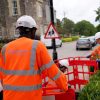Hyperoptic Study Examines Broadband in the Post Pandemic Home

UK ISP Hyperoptic and SAY Property Consulting have published a new report, which surveyed over 2,000 members of the public and 311 property industry experts to help understand how the COVID-19 crisis has changed internet connectivity in homes and what the post-pandemic world may look like. Just 10% of people want to go back to the office full-time.
Working from home is of course nothing new to modern business culture, although the degree to which it’s supported often depends upon the job you’re doing (waiters in a restaurant or on a factory assembly line have little use for it), as well as how capable the IT and network setup is at your place of work.
Nevertheless, the COVID-19 pandemic and its associated lockdown has forced many businesses to adapt in order to facilitate remote working away from the office. In many ways that genie is now out of the bottle and, as the pandemic slowly begins to come under some control (hopefully), few now expect working life to return to exactly the way it was before.
Advertisement
According to the new ‘A Connection to Tomorrow‘ survey, some 49% of respondents said that they want to continue working from home full-time and only 10% said they want to go back to working full-time in an office. A further 18% have said they would like this arrangement to be part-time.
Summary of Results
— Just 22% of property experts wish to work from home full-time, but 61% favour part-time work from home in some form.
— 52% of the public said Wi-Fi quality was something they could not compromise.
— 42% of the public said they would be happy to switch ISPs to get better broadband and, when asked ‘how important is your broadband speed to your enjoyment of living in your home currently’, 45% listed this as ‘very important’ (up 5% from pre-pandemic levels).
— 54% of those who work in the property sector stated that they’d noticed an increase in complaints about broadband ISPs, while only 35% thought that the property industry had been responsive to the greater need for home internet speeds.
— Complaints about ISPs differed significantly between houses and flats. Over half (54%) of complaints concerned houses, with much less (21%) for traditional/conversion flats and 19% for build-for-sale flats. Only 6% were from build-to-rent blocks of apartments, suggesting that these developments typically have a higher quality of broadband provision.
— 43% of UK adults worked from home in 2020, rising to 58% of Londoners – the highest of any region in the country. Perhaps not surprisingly, people aged 25-34 (59%) and 35-44 (59%) were much more likely to have worked from home than other groups, where it drops to just 28% for those over 55.
— 11.85% of the public have invested in faster broadband during lockdown (upgrades etc.), which rises to 36% among property experts.
— 49% of consumer respondents said the television had been their most important piece of technology during lockdown, rising to 62% of over 55s. 18-24s were the most likely to be attached to their games console, with 16% rating it as their most important piece of tech. Some 9% of respondents have started a new digital content service subscription, such as Netflix or Disney Plus, during lockdown.
However, despite all the above, some 17% of respondents say that while they understand the need to continue working from home, they “don’t really enjoy it” (admittedly, this is probably true for many office workers too).
Liam McAvoy, Hyperoptic’s Senior Director of Business Development, said:
“Last year we issued our whitepaper ‘a connection to tomorrow,’ which explored the future of technology and communications in real estate. Since then, we’ve faced the most disruptive period the UK has ever seen with the advent of Covid-19. However, times of disruption can have the unexpected benefit of acting as a catalyst that brings forward plans that may have already been in train, driving innovation and lasting change for the better.
We wanted to get insight into how the property sector and residents have responded to the unprecedented changes that have been forced onto them. The overwhelming consensus is that the function of the home has changed – and will have huge and long-lasting impact for the whole of the property sector, across technology, functionality and design.”
One common expectation is that more people will now adopt working from home either full-time or part-time than pre-pandemic, which in turn tends to suggest less of a need to live inside a busy city. Indeed other surveys have indicated that this may encourage a greater move of people into the countryside.
The survey asked its property industry respondents if they’d seen evidence that people were looking to move away from cities due to the pandemic and the increased acceptance of remote working. Some 36% had seen clear evidence, while 43% said they had seen some evidence. Time will tell. The whitepaper concludes with a number of predictions for the post-pandemic home.
Advertisement
Predictions for Post-Pandemic Homes
— Apartment sizes may shrink further to create more shared amenity space to support co-working, but also to further enhance on-site services: gyms, food offerings, and delivery reception
— Since communal space won’t always be appropriate, developers may look to include spaces specifically for video calls with space for a laptop and an appropriate background
— Noise becomes a bigger issue when people spend more time at home, so our panel suggested relocating washing machines out of the kitchen so you can work undisturbed at the kitchen table
— Good quality lighting, both natural and artificial, also becomes a critical issue when people are spending more time at home through the day
— Air quality is also an issue: future homes will likely have more attention paid to ventilation
— Home working could have a large carbon footprint because of the poor quality of insulation in UK homes, so improving insulation on existing stock is likely to see renewed focus
— Convenience is key, so developers will continue to invest in smart technologies that allow tenants to interact with both the building and management services
Mark is a professional technology writer, IT consultant and computer engineer from Dorset (England), he also founded ISPreview in 1999 and enjoys analysing the latest telecoms and broadband developments. Find me on X (Twitter), Mastodon, Facebook, BlueSky, Threads.net and Linkedin.
« New Toolkit to Aid Scotland’s Rollout of 5G Mobile Broadband






















































Interesting that they never mentioned upload speeds. I would have thought the pandemic would have highlighted the need for greater upload. Fortunately for me, moving from Virgin media to 5G has quadrupled my upload.
I’m also surprised at the number of people using WiFi for video conferences; the same handful of people are always allegedly losing their connection. Or maybe they just use it as an excuse. Have they not heard of ethernet cables ?
I use WiFi on my laptop when doing video calls but I’ve invested in a WiFi 6 capable asus mesh system
When it comes to our upload speeds they always come symmetrical to the download speeds, except for the 50 Mbps package that has 5 Mbps upload and 50 Mbps download.
We agree that nothing beats the cabled connection! 🙂
I mean, you’re not the only ones.
But fair play, I’d rather have symmetric than asymmetric. I’m not wishing to cause offence, but too bad you are only interested in Cities and new build houses. I’d buy Hyperoptic, if I lived in a £600,000 1 square metre flat in London or a £1m new build in Surrey.